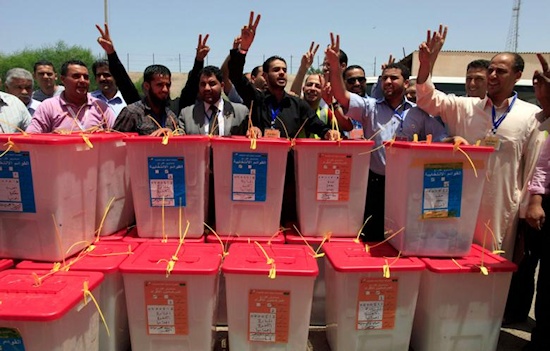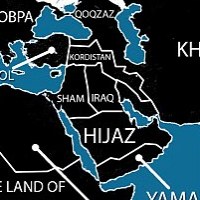![]()
RubinReports | By Barry Rubin

High Election Commission workers chant the national anthem behind ballot boxes which just arrived from the region of Kufra, five days after Saturday’s landmark national elections, at the High Election Commission Center in Tripoli 12 July 2012. (Photo: Reuters – Zohra Bensemra)
Hussein Ibish is one of the more interesting Arab writers on regional affairs. In a piece published by the liberal site Lebanon Now he contemplates the broader meaning of the Libyan election. Although official results are not in yet it appears that the U.S.-backed National Forces Alliance led by the NATO-installed leader, Mahmoud Jibril, won a big victory.
In this light, Ibish critiques the idea that “assumes the inexorable rise of Islamist parties.” He is right and properly adds:
“Libya shows that Islamists can be defeated in contemporary Arab elections, and this should be celebrated and emulated, not ignored or dismissed.”
Part of the problem, of course, is that the mass media and the analysts it generally features have so often — with almost monopolistic power — repeated that Islamists wouldn’t win or that it didn’t matter because they are really moderate. This has created a reaction among wiser people who warn the Islamists are winning and aren’s moderate.
Ibish doesn’t want the Islamists to win and stresses that they can be defeated. The question, of course, is how they can be defeated.
To begin with, seeing what happened in Libya reminds us that Islam is not some monolithic force that is inevitably radical or Islamist. Just because revolutionary Islamists can validly use quotations from the Koran and other Muslim holy books to justify their ideology doesn’t mean everyone will be convinced they are right.
Ibish quotes the columnist Charles Krauthammer as writing that what’s “taking place in the region is an Islamist ascendancy, likely to dominate Arab politics for a generation.” And Ibish responds:
“There is no doubt that Islamist parties will be major factors in the coming decades. But what Jibril’s victory demonstrates is that the ‘Islamist ascendancy’ is by no means assured or even likely.”
I think Islamist ascendancy is likely but not assured. That’s not because I believe Arab politics are “relatively homogenous,” far from it. The problem is the collapse of Arab nationalism coupled with the weakness of liberal reformist views, and the Islamist side’s relative coherence and organization.
Let’s briefly look at some countries:
— Bahrain, Jordan, and Saudi Arabia: Islamists have been defeated by force.
— Egypt: Islamists have a huge popular base. Yet some of their support came from a reaction against the Mubarak regime and the messy status of its opponents. Egypt does, however, have an institution — the military — able to contain the Islamists.
— Gaza Strip: Hamas won an election by a small margin then staged a coup. It benefitted greatly from the corruption and incompetence of its rival Fatah and the Palestinian Authority. I don’t think Gazans love Hamas but its armed power ensures that it will remain in power.
— Iraq: The country has lots of problems but an Islamist takeover isn’t one of them, though Islamists do seem to have huge power in the south.
— Syria: If the opposition wins the civil war, which seems increasingly likely, the Muslim Brotherhood has a good chance of gaining power. But the outcome is far from certain. Only 60 percent of the population — though almost all those backing the opposition — is Sunni Arab.
— Tunisia: The Islamists won the election but sixty percent voted for non-Islamist liberal parties. If moderates had only united they would have won. The coalition partners could restrain the Islamists.
— Turkey: Islamists win because they are patient, cautious, and camouflage themselves. Their opponents were in chaos and lacked leadership; the Islamists seized control of the nationalist card and were able to deliver (or just benefitted from) a good economy. Although they are trying to get such control over the institutions so as to stay in power forever, they could be voted out.
So, yes, not everything is going the Islamists’ way in a tidal wave. Still, they are setting the agenda and in every country where they have failed to seize state power they now constitute the main opposition grouping.
Back to Libya. Ibish accurately rejects the claim of some Western observers that Jibril’s alliance is itself essentially Islamist. I’d suggest Jibril’s approach is a traditionalism popular in Libya, a country sick of former dictator Muammar Qadhafi’s crazy experiments. The traditionalist factor — pious, socially conservative but not radical Islamist — should not be counted out anywhere. After all, it’s the main reason why the monarchies — including Morocco and Jordan as well as the Gulf Arab states — are surviving.
There are, then, a number of important lessons here:
— Islam and revolutionary political Islamism are not identical. Islamists have a real advantage over liberal reformers in recruiting Muslims but Muslims often choose not to be Islamists. They can give their loyalty to a tribe, state, ethnic group, the idea of a moderate democratic alternative, or a traditionalism that mistrusts Islamism.
— Islamists are not fated to win everywhere. Each country is different.
— The weakness of reformers–including political incompetence, factionalism, and lack of funding — is as big a factor as the revolutionary Islamists’ strength.
— The next era in the Middle East will be dominated by the debate over whether Islamism is the way to go. Islamists will radicalize the regional scene, carry out terrorism at home and abroad, and inflict repression on their own people wherever they get power. But remember that even at the height of Arab nationalism — in the 1950s and 1960s — that movement inevitably produced Arab Muslim enemies, people who didn’t want to knuckle under to President Gamal Abdel Nasser’s Egypt or the Ba’th Party that ruled in Iraq and Syria.
Finally, it is precisely because a battle is going on — a battle for control over Islam; a battle for control over each country — Western policy is important. That is precisely why Western policy should help liberal reformers, traditionalists, or pragmatic militaries, depending on specific circumstances, and not Islamists.
If Islamists were winning everywhere and no one could stop them, Western policy wouldn’t matter and the Obama Administration could claim that it is on the side of history — anti-American history, but still history. But because Ibish is basically correct, that policy is not only disastrous but also tragic.



 RSS
RSS










Latest Comments
Hello Mike, Thank you for your positive feedback to the article. I felt there wasn’t too much critical analysis of ...
Thanks for this considered and well constructed article. A follow up article on the manner in which the editorial contro...
THE CLUELESSNESS OF CLAIMING THAT OBAMA'S MIDDLE EAST POLICIES WERE A FAILURE CANNOT BE FURTHER FROM THE TRUTH, WHAT THE...
As long as Obama is the president of the usa do not trust the us government......
Thank you for an good read....